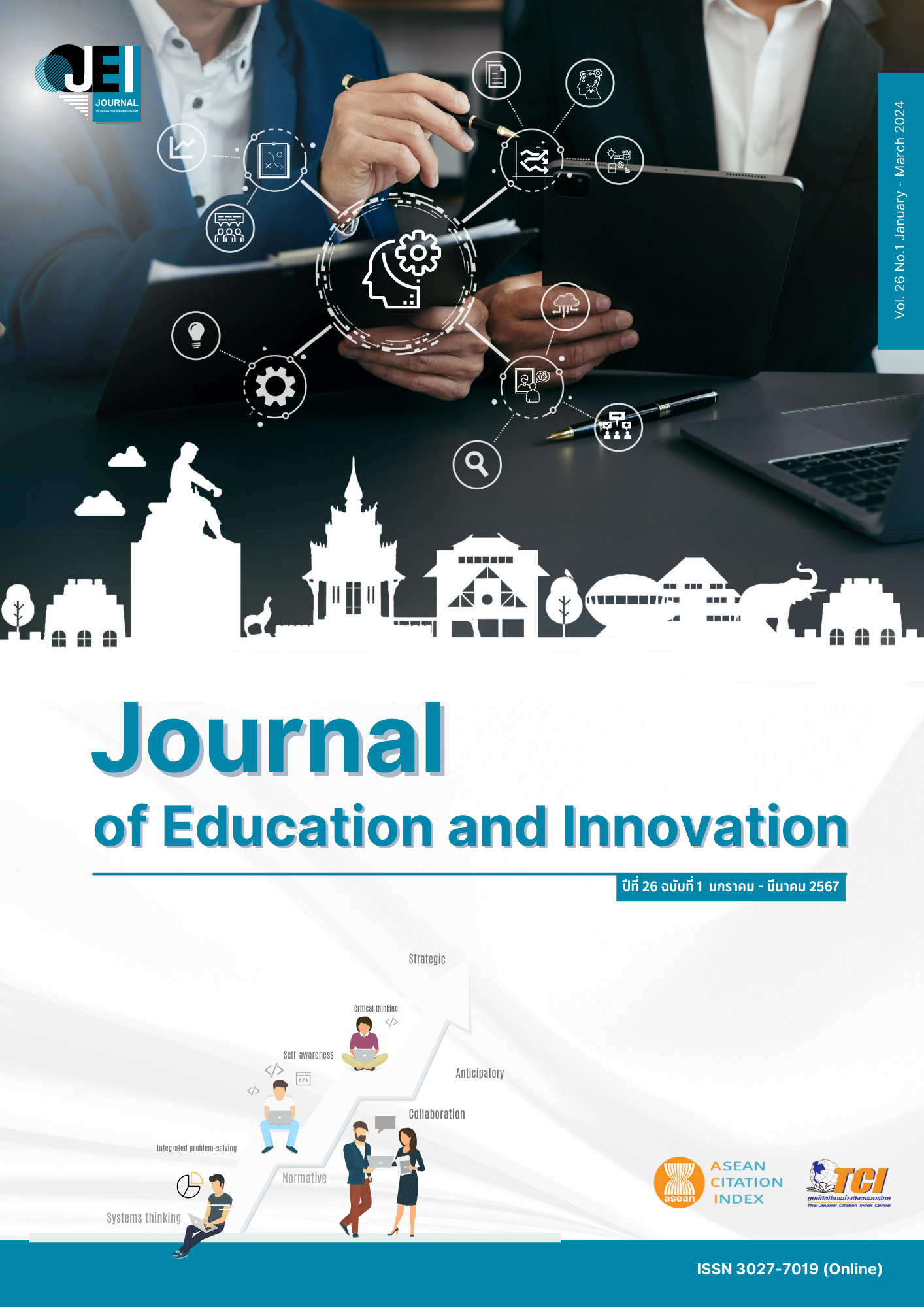ENHANCING THAI TEACHER'S TECHNOLOGICAL PEDAGOGICAL CONTENT KNOWLEDGE FOR STEM EDUCATION WITH IPAD
Main Article Content
Abstract
The objectives of this research were as follows: 1) To compare Thai teachers' Technological Pedagogical Content Knowledge (TPACK) for STEM education using iPads before, during, and after participating in a teacher professional development program; 2) To compare the perception and understanding of Thai teachers in STEM regarding the use of digital technology tools; 3) To develop STEM education teaching and learning using digital technology tools and iPads; and 4) To establish continuous coaching for educational supervisors and administrators. This research employed a mixed methods approach with research participants including science teachers, math teachers, technology teachers, administrators, and supervisors from 148 schools. Data collection tools included self-assessment surveys on knowledge in content, teaching methods, and technology, assessments of STEM lesson plans, questionnaires on teachers' perception and usage of digital technology tools, semi-structured interviews, classroom observations, and reflective journals as part of Professional Learning Communities (PLCs). Data analysis included descriptive statistics and inductive methods. The findings revealed that the majority of teachers (89.04%) had a positive perception that using digital technology tools can enhance students' creative thinking and communication skills; 2) The knowledge development in instructional content and technology of teachers increased through evaluating the design of lesson plans and teaching practices after participating in the professional teacher development program; 3) 83.56% of teachers' teaching practices showed a significant correlation with the use of digital technology; 4) The results with administrators and educational supervisors who support teachers' teaching practices in the roles of managers and intellectual coaches using a continuous support format combined with classroom observation.
Article Details

This work is licensed under a Creative Commons Attribution-NonCommercial-NoDerivatives 4.0 International License.
The owner of the article does not copy or violate any of its copyright. If any copyright infringement occurs or prosecution, in any case, the Editorial Board is not involved in all the rights to the owner of the article to be performed.
References
Breiner, J. M., Harkness, S. S., Johnson, C. C., & Koehler, C. M. (2012). What Is STEM? A Discussion about Conceptions of STEM in Education and Partnerships. School Science and Mathematics, 112, 3-11.
Creswell, J. W., & Plano, C. V. L., (2007) Designing and conducting mixed methods research.
Thousand Oaks, CA: Sage Publication.
Dejarnette, N.C. (2012). America’s Children: Providing Early Exposure to STEM (Science, Technology,
Engineering and Math) Initiatives. Education, 133(1), 77-84.
Goksoy, S. (2016). Analysis of the relationship between shared leadership and distributed leadership. Euras. J. Educ. Res., 65, 295–312.
Hamtanon, P., (2015). Discussion Focused on the Importance of STEM Education, Indicating the Necessity 21. Retrieved from www.vcharkarn.com
Henderson, K., & Tilbury, D. (2004). Whole-school Approaches to Sustainability: An International Review of Sustainable School Programs. Australian Research Institute in Education for Sustainability: Australian Government.
Kennedy, A., Deuel, A., Nelson, T. H., and Slavit, D. (2011). Requiring collaboration or distributing leadership. Phi Delta Kappan 92, 20–24.
Kijkuakul, S. (2015). STEM Eucation. Journal of Education Naresuan University, 17(2), 201-202.
Klomin, K., Namnak. C., Kaewurai, W., and Thumrongsotthisakul, W. (2014). A Development of Learning Model Based on Constructivist Theory of a Scaffolding to Enhance on Mathematic Problem-Solving Skill for Lower for the Mattayomsuksa 1. Journal of Education Naresuan University, 16(2), 129-139.
Institute for the Promotion of Teaching Science and Technology. (2015). STEM education activity guide Grade 1-3 level. Bangkok: Suksapanpanit.
Institute for the Promotion of Teaching Science and Technology. (2015). STEM education activity guide Grade 4-6 level. Bangkok: Suksapanpanit.
Institute for the Promotion of Teaching Science and Technology. (2015). STEM education activity guide Mathayom 1-3 level. Bangkok: Suksapanpanit.
Institute for the Promotion of Teaching Science and Technology. (2015). STEM education activity guide Mathayom 4-6 level. Bangkok: Suksapanpanit.
Leithwood, K., Harris, A., & Hopkins, D. (2019). Seven strong claims about successful school leadership revisited. School Leadership & Management, 40(1), 5-22. DOI: 10.1080/13632434.2019.1596077
Leithwood, K., & Jantzi, D. (2000). Principal and teacher leadership effects: A replication. School Leadership & Management, 20(4), 415-434. DOI: 10.1080/713696963
Mishra, P., & Koehler, M. J. (2006). Technological pedagogical content knowledge: A framework for teacher knowledge. Teachers College Record, 108 (6), 1017–1054.
Office of the Basic Education Commission. (2015). Study time management guide: Reduce study time, increase learning time. Bangkok: Ministry of Education.
Rosenblatt, L. M. (1978). The reader, the text, the poem: The transactional theory of literary work. Carbondale, IL: Southern Illinois University Press.


